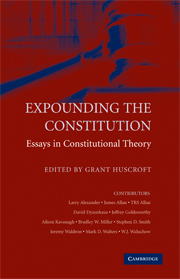Book contents
- Frontmatter
- Contents
- Preface
- Contributors
- Introduction
- PART I MORALITY AND THE ENTERPRISE OF INTERPRETATION
- PART II JUDICIAL REVIEW, LEGITIMACY, AND JUSTIFICATION
- 5 Constitutions, Judicial Review, Moral Rights, and Democracy: Disentangling the Issues
- 6 The Incoherence of Constitutional Positivism
- 7 The Travails of Justice Waldron
- 8 Deference or Defiance? The Limits of the Judicial Role in Constitutional Adjudication
- PART III WRITTEN AND UNWRITTEN CONSTITUTIONAL PRINCIPLES
- Index
5 - Constitutions, Judicial Review, Moral Rights, and Democracy: Disentangling the Issues
Published online by Cambridge University Press: 25 July 2009
- Frontmatter
- Contents
- Preface
- Contributors
- Introduction
- PART I MORALITY AND THE ENTERPRISE OF INTERPRETATION
- PART II JUDICIAL REVIEW, LEGITIMACY, AND JUSTIFICATION
- 5 Constitutions, Judicial Review, Moral Rights, and Democracy: Disentangling the Issues
- 6 The Incoherence of Constitutional Positivism
- 7 The Travails of Justice Waldron
- 8 Deference or Defiance? The Limits of the Judicial Role in Constitutional Adjudication
- PART III WRITTEN AND UNWRITTEN CONSTITUTIONAL PRINCIPLES
- Index
Summary
Should countries have constitutions? Should there be American or Canadian-style judicial review of constitutional questions? Should constitutions have provisions establishing rights? Or is there a fundamental right to decide democratically the most important issues confronting us and, particularly, the content of the rights we possess?
These questions are frequently not distinguished, with the predictable result that an answer to one is taken to be an answer to another. I intend, however, to make it clear that and why they are separate questions.
SHOULD COUNTRIES HAVE CONSTITUTIONS?
First, what does it mean to have a constitution? Answering this question is not easy.
For one thing, a constitution need not be written. It is oft said that the British have an “unwritten constitution,” which is not just an ironic way of saying they do not have one. And there are numerous treatises and other scholarly works devoted to British “constitutional law.” There are, of course, quite compelling reasons why modern constitutions tend to be written, especially if they are lengthy and complex. But nothing in the nature of constitutions requires that they be written.
A more promising way of thinking about constitutions is in terms of their being “higher law.” Put differently, constitutions are what validate ordinary law – the law produced by legislative and administrative bodies and by common-law courts. Ordinary law is valid law, when it is so, just because it is authorized by the higher law of the constitution.
- Type
- Chapter
- Information
- Expounding the ConstitutionEssays in Constitutional Theory, pp. 119 - 137Publisher: Cambridge University PressPrint publication year: 2008
- 1
- Cited by



